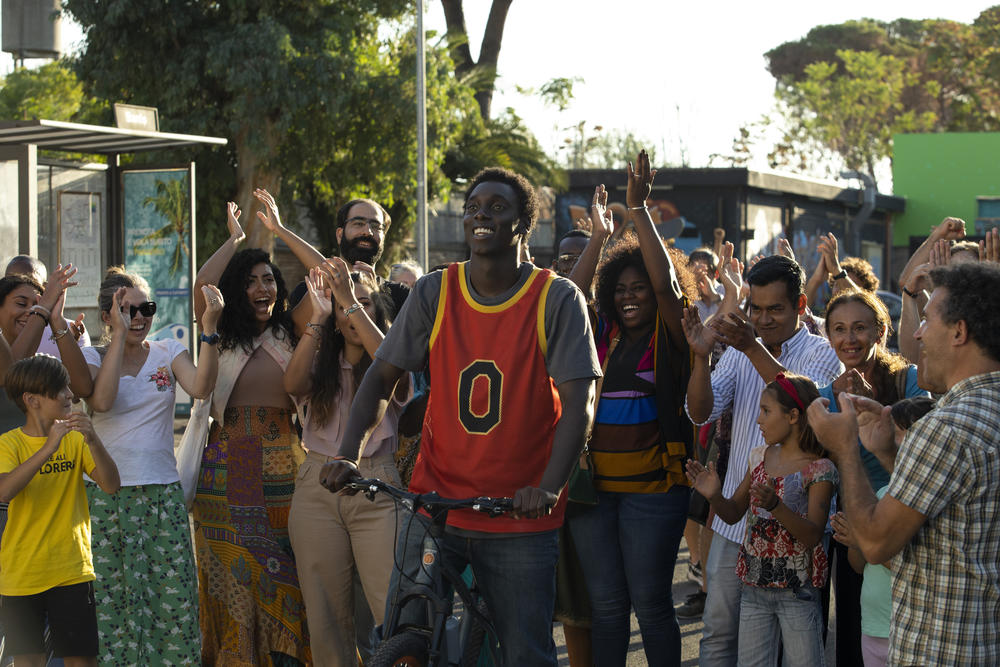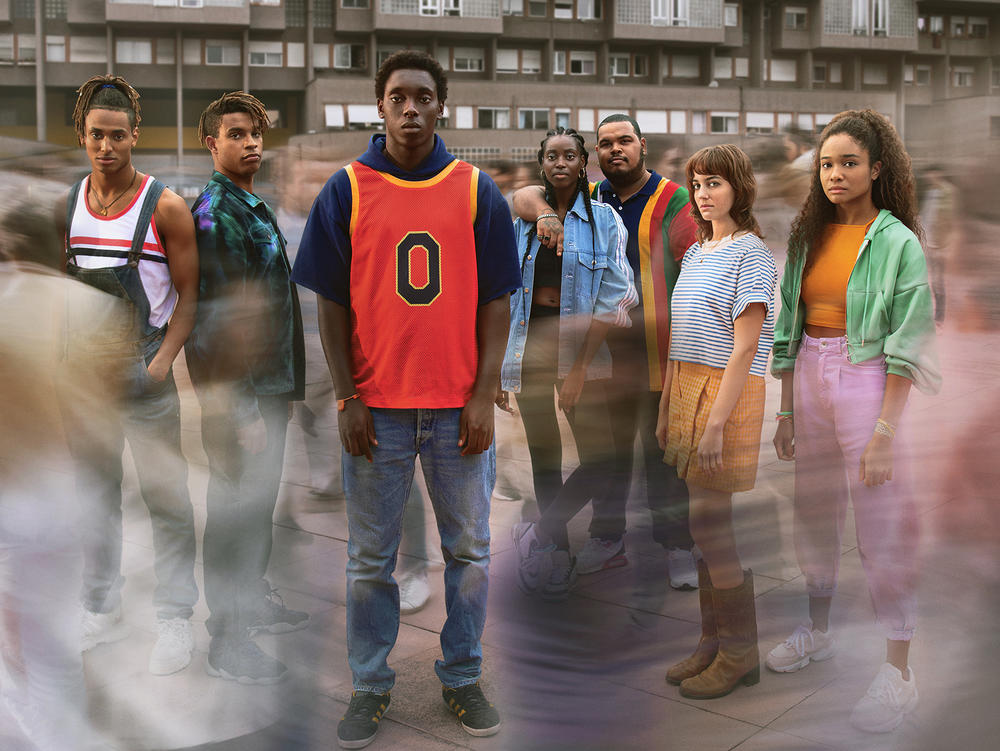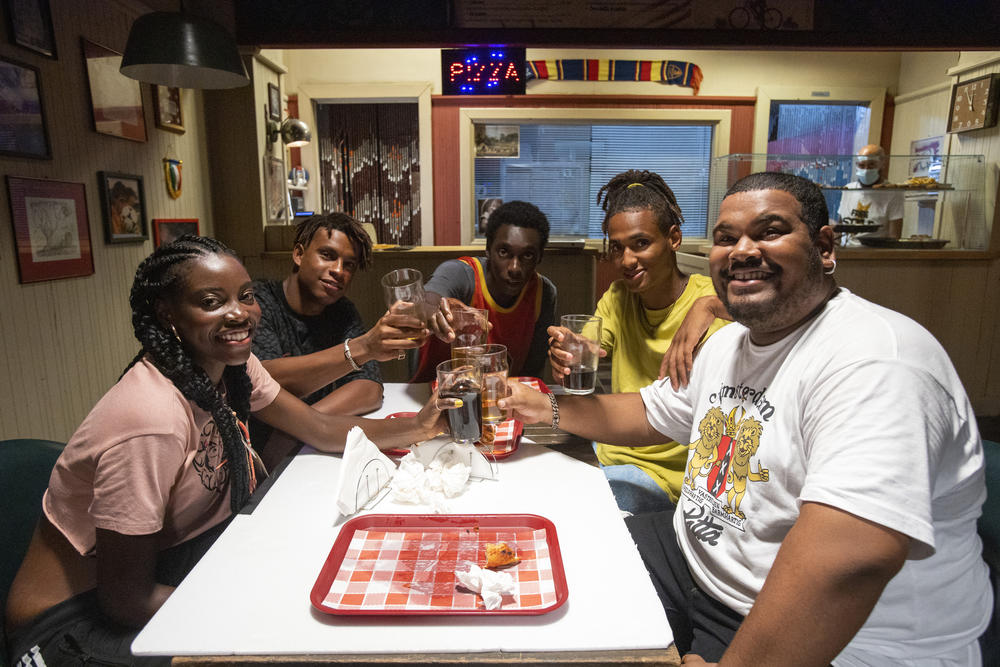Section Branding
Header Content
In New Italian Netflix Series 'Zero,' A Black Hero Makes Invisibility His Superpower
Primary Content
ROME — In a TV landscape where racial insensitivity is rampant, Netflix's Italian-language series Zero is a milestone: Italy's first TV series with a predominantly Black cast.
A superhero fantasy meets coming-of-age story of second-generation Italians, Zero stands out for depicting the country's increasingly multicultural society.
Zero is the nickname of Omar, the lead character, a young Black Italian delivery worker who is more or less ignored by the white society around him. But his metaphorical invisibility turns into a magical power when he discovers he can actually make himself invisible. He becomes a superhero, helping save his neighborhood from gentrification by greedy investors.
Released in April, the series was written by Antonio Dikele Distefano, a 28-year-old author of six novels. Born in Italy to Angolan parents, Distefano tells NPR his aim was not to write an anti-racism manifesto, but to create something universal.
"I wanted to use the emotions that we all share," he says. "It's laughter and tears that unite us, not the color of our skin or having the same opinions."
The series was shot in Milan — not just in the elegant city center known to tourists, but mostly in its gritty, working-class outskirts, home to many of Italy's growing migrant communities.
An estimated 10% of Italy's population is made up of foreign nationals. Migration to Italy increased substantially following the political turmoil triggered by the Arab Spring a decade ago — particularly from countries in north Africa.
Anti-migrant sentiment among Italians reached a peak in 2018, with the electoral success of Matteo Salvini, the stridently anti-immigration leader of the right-wing League party.
But with an aging population dependent on foreign-born caretakers, and with Italy's extremely low birth rate, many Italians are aware the country's economic future depends on new migrants joining the labor force. New businesses, restaurants and grocery shops that that have opened in Italian cities in recent years reflect the changing demographics, and have transformed many neighborhoods into multicultural hubs.
And now, the world of entertainment is becoming aware of a new potential audience in Italy's second-generation youth.
"We are looking for stories that create empathy and emotions," says Ilaria Castiglioni, Netflix's manager for Italian series. "In order to do that, our story needs to be authentic and at the same time, universal."
She says Distefano knows how to convey the universal sense of insecurity and invisibility in coming-of-age stories.
"Antonio has a strong voice," she says. "Plus, he has the second-generation experience, which is very unique."
That experience is highlighted by the series' soundtrack, which includes "Red Bull 64 Bars x Zero" by Marracash, one of the most popular rappers among Italy's multicultural youth.
The score and dialogue — peppered with the slang of second-generation Italian youth — mark a breakthrough in Italy's usual TV fare featuring mainstream white performers and plot lines.
Netflix does not provide ratings, but reviews have been good. Commentators have hailed the series for opening up new roles for Black actors who had otherwise been relegated to portraying stereotypes.
"Many [Black] actresses complained about the fact they are cast to be prostitutes or to be dealers' partners or refugees coming with a boat," says Angelica Pesarini, an Italian sociologist of Eritrean and Somali origin who specializes in issues of race, colonialism and gender identity.
Much of what's on Italian TV is even worse — comedy teams utter racial slurs and make offensive gestures mocking Asian people as a means to satirize political correctness, and variety shows often use blackface.
Zero finally provides role models for young Black Italians who don't see their worlds reflected in most mass entertainment, Pesarini says: "This is so important for the kids and teenagers that will see this series and they will see that Black man, a young Black man, can be a superhero."
Giuseppe Dave Seke, 25, plays the lead character. It's his very first acting experience. Born to Congolese parents, Seke tells NPR the series is "opening up a door in Italy that was just waiting to be opened."
Days after Zero's release, the actor was mobbed by autograph-seeking schoolchildren in the Milan outskirts where the series was shot.
Castiglioni says Netflix's goal is mostly to entertain. "And if we create good entertainment that creates a debate, that's a plus," she says, "a conversation that sparks because it means that with our show, we hit the zeitgeist."
This zeitgeist ends with a cliffhanger. But it's too soon, says Castiglioni, to announce if a second season is in the works.
Copyright 2021 NPR. To see more, visit https://www.npr.org.



